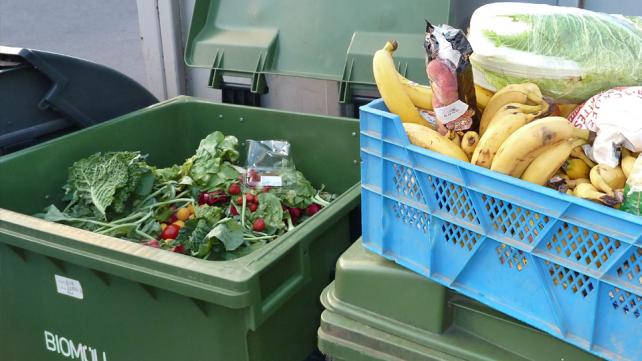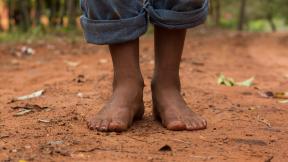
Poverty in America? One of the richest countries in the world?
Yes, poverty is a reality in America, just as it is for millions of other human beings on the planet. According to the US Census Bureau, 35.9 million people live below the poverty line in America, including 12.9 million children.
This is despite abundance of food resources. Almost 100 billion pounds of food is wasted in America each year. 700 million hungry human beings in different parts of the world would have gladly accepted this food.
Here are some statistics on the nature of poverty and the waste of food and money in America.
-In 2004, requests for emergency food assistance increased by an average of 14 percent during the year, according to a 27-city study by the United States Conference of Mayors.
-Also in this study, it was noted that on average, 20 percent of requests for emergency food assistance have gone unmet in 2004.
-According to the Bread for the World Institute 3.5 percent of U.S. households experience hunger. Some people in these households frequently skip meals or eat too little, sometimes going without food for a whole day. 9.6 million people, including 3 million children, live in these homes.
-America's Second Harvest (http://www.secondharvest.org/), the nation's largest network of food banks, reports that 23.3 million people turned to the agencies they serve in 2001, an increase of over 2 million since 1997. Forty percent were from working families.
33 million Americans continue to live in households that did not have an adequate supply of food. Nearly one-third of these households contain adults or children who went hungry at some point in 2000.
U.S. Dept. of Agriculture, March 2002, "Household Food Security in the United States, 2000"
Wasted food in America
-According to America’s Second Harvest, over 41 billion pounds of food have been wasted this year.
-According to a 2004 study from the University of Arizona (UA) in Tucson, on average, American households waste 14 percent of their food purchases.
Fifteen percent of that includes products still within their expiration date but never opened. Timothy Jones, an anthropologist at the UA Bureau of Applied Research in Anthropology who led the study, estimates an average family of four currently tosses out $590 per year, just in meat, fruits, vegetables and grain products.
Nationwide, Jones says, household food waste alone adds up to $43 billion, making it a serious economic problem.
- Official surveys indicate that every year more than 350 billion pounds of edible food is available for human consumption in the United States. Of that total, nearly 100 billion pounds - including fresh vegetables, fruits, milk, and grain products - are lost to waste by retailers, restaurants, and consumers.
-“U.S.-Massive Food Waste & Hunger Side by Side” by Haider Rizvi
-According to a 1997 study by US Department of Agriculture's Economic Research Service (ERS) entitled "Estimating and Addressing America's Food Losses", about 96 billion pounds of food, or more than a quarter of the 356 billion pounds of edible food available for human consumption in the United States, was lost to human use by food retailers, consumers, and foodservice establishments in 1995.
Fresh fruits and vegetables, fluid milk, grain products, and sweeteners (mostly sugar and high-fructose corn syrup) accounted for two-thirds of the losses. 16 billion pounds of milk and 14 billion pounds of grain products are also included in this loss.
Food that could have gone to millions
According to the US Department of Agriculture, up to one-fifth of America's food goes to waste each year, with an estimated 130 pounds of food per person ending up in landfills. The annual value of this lost food is estimated at around $31 billion But the real story is that roughly 49 million people could have been fed by those lost resources. (For your persona jihad against wastage, see A Citizen's Guide to Food Recovery
(The figures below are 1998 figures)
- Proportion of Americans living below the poverty level: 12.7 percent (34.5 million people)
- The average poverty threshold for a family of four: $16,660 in annual income
- The average poverty threshold for a family ofthree: $13,003 in annual income
- Poverty rate for metropolitan areas: 12.3 percent
- Poverty rate forthose living inside central cities: 18.5 percent
- Poverty rate for those living in the suburbs: 8.7 percent
- Percentage and number of poor children: 18.9 percent (13.5 million)
- Children make up 39 percent of the poor and 26 percent of the total population.
- The poverty rate for children is higher than for any other age group.
Child poverty:
- -for children under age 6 living in families with a female householder and no husband present: 54.8 percent
- -for children under age 6 in married-couple families: 10.1 percent
- Poverty rate for African Americans: 26.1 percent
- Poverty rate for Asians and Pacific Islanders: 12.5 percent
- Poverty rate for Hispanics of any race: 25.6 percent
- Poverty rate fornon-Hispanic whites: 8.2 percent
Photo Attribution: http://commons.wikimedia.org/wiki/File:Recovering_wasted_food.JPG








Comments
at this moment in time i have been set a major presentation on poverty. There are many aspects on poverty which i am going to cover. by reading this article has really give me an insight in to poverty in america. thanks very much. i hope this article gives help to others the same as it has given me. thanks agen ;-)
Location
A lot of other people have the same reason for loving this article as I did. High School research paper. Do they all want to make SURE we know about all the little nasties in life nowadays? Bleh. Yeah. Your article was great! Thanks again! ^_^ Er... wow... some people posting comments need to watch thier grammer...
Location
Jazakum Allah kair for this informative article. it really helped me in my research. It would be nice if the dates of stats could be updated for any changes over the course of the past 5-6 years. thanks again.
Location
The statastics provided hurt a lot to see so many people right in here are dying amidst plenty!! It appears the system of democracy has to be refined a bit so that the gap between the haves and have not is narrowed . Our democracy has unfortunately increased the gap and one sees 1% of the haves are allowed to create such situations with impunity. May be before we embark on this collossal task of rectifying the political situation, we could ,as one writer suggest, learne not to waste and be able to provide the poor what they need by mobilising everone to play ones part in bringing about an equitable distribution of basic requirements to the downtrodden people. There must be a way to start charity at home first and educate the mass as to what is required to be done to improve the situation. If our situation is so precarious imagine the situation in the underdeveloped countries, Africa and India. A plan need to be worked out soon .
Location
This article was extremely informative, it really gets you to think about the situatuation of the worls, and where we're headed. Thanks for the information the stats helped me to complete a project for this "Justice and Peace," course i'm taking.
Location
I just watched a special on NBC on Oprah Winfry in Africa. It caused me to ponder where did the one can of beans come from in my kitchen; the market of course, and to think about the hundreds upon thousands of cans of beans in other markets in other cities. It's an endless circle of thought---where did it come from and to where does it go. I was stationed in Spain while in the Navy, and my wife and I saw so much poverty. Once while we traveled to a small village, a small child came and begged for something. I gave him a few Pesatas, equal to perhaps a dollar ot two. He was so grateful and he cried. That could buy him and his family bread for a week. I quess I'm seaching, why in America? The thought of as the richest country in the world. Thanks for listening.
Location
I have to comment for Sean from California. It's important to not generalize. When you assume to know who's "generally stupid," but can't spell or use the proper words to express your chosen idiom, you become "generally stupid" yourself.
Location
Thanks for the great article. I have to write a 7 page paper on minimum/living wage in Ameica. I have one question for anyone to answer. You say Americans are wasting tons of food. That is a problem. So what should we do about that? Should we give all of our leftover food to poor people? Should we pack up our have eaten hamburgers, and ship them downtown to Cabrini Green where they can finish the meal? Wasting food is a big problem, but as I see it, the only thing we can do to stop wasting food is to stop buying so much. And even that wouldnt help the poor people everywhere. Thanks.
Location
I think that people don't know how much food they are wasting,and if they did it probably wouldn't matter still.Because people see it in commercials,and have other resources for the information.And they think that its not their problem.
Location
Thanks for the article it is informative. I noticed that some of your stats were 5 or 6 years old it would be interesting to see where we are today. I enjoyed reading the discussions. A few people wrote about how there are many contributors to poverty; I could not agree with them more. We need help those who truely cannot provide for themselves and force those that should be providing to do so. I did want to address Jacob's comment about the War in Iraq. Poverty is not the only issue in the world that needs to be taken care of. I am in the military and it is interesting how you protray the reasoning behind the War. If you are going to openly critisize something at least give the whole picture and reasons behind it. Why did you not mention the cruel things that Saddam was doing to his people. What about his support for terrorists. Sorry about going on about the War when we should be talking about poverty, but it gets me when someone will throw there idea into a conversation no matter what is being talked about. I could not let this go with out saying something.
Location
Pages
Add new comment